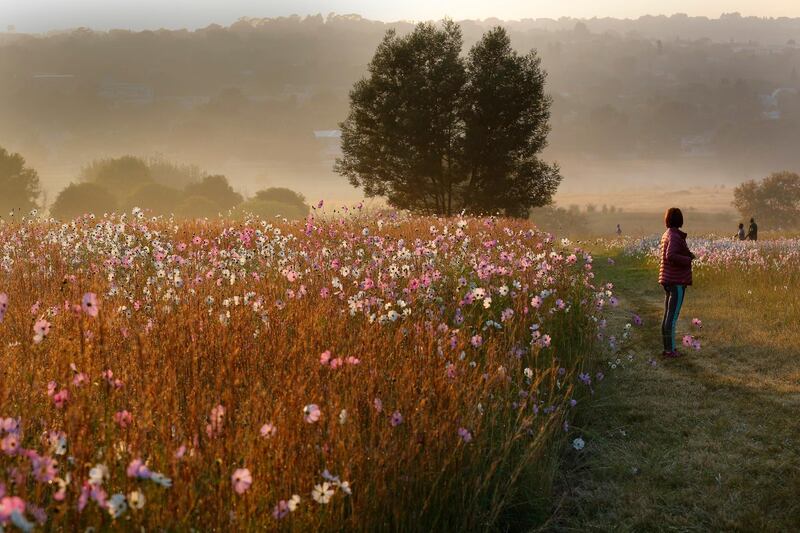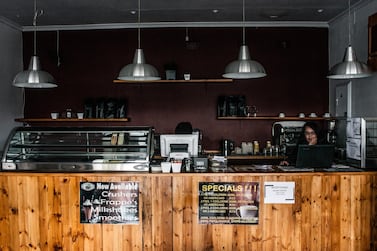Knysna, South Africa | Fuming motorists could do little but sit and wait until the protestors decided to move. The 150 or so people blockading one of South Africa's busiest roads as they demanded land however, were in no mood to quit.
“We’ve asked and asked and asked. Now it’s time for action,” said Thabo Mbatha, one member of the group gathered on the N2 highway at a suburb outside the town of Knysna, on the south coast of the country.
Like most of his fellow protestors, Mr Mbatha lives in a rented wooden shack, which he built himself two years ago. Previously, home had been a cottage on a nearby farm where he also worked. But the property had been sold and the new owner evicted all the workers.
“I need land to build a house for my family. We need a place to call our own. And the municipality does not hear us when we ask,” Mr Mbatha says.
After about an hour of staring down angry motorists that formed a kilometres-long queue, and following a brief discussion with police, Mr Mbatha and the other protestors retreated, letting traffic flow again. A vague promise from the Knysna municipality to build 200 new homes was secured. But, should this not be honoured soon, the protestors would be back, Mr Mbatha warned.
Protests such as these are now occurring almost daily around the country, and tensions around land occupancy are increasing as the country approaches elections in May. The ruling African National Congress (ANC) has emerged from years of corruption scandals with diminished support from the black majority.
In a bid to re-invigorate its following, the ANC said publicly that it is open to changing the constitution to allow the state to confiscate property without compensating owners. The 57,000 or so mostly white farmers who form the backbone of organised agriculture are especially feeling the pressure. Political groups are pushing for eviction of whites from farms to be replaced by blacks, as was done in Zimbabwe.
In response, many farmers are now evicting workers who they fear may someday claim tenancy rights, says Carmen Louw, spokesperson for Women on Farms, a non-profit that supports agricultural labour rights.
“Whenever there’s talk of a radical change in law, we see an increase in evictions,” Ms Louw says. “Farmers want people off their land before the elections, and before workers can claim permanent occupancy rights.”
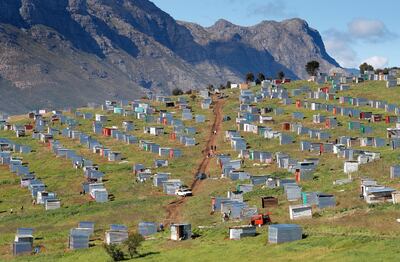
Commercial agriculture is one of the largest employers in the country, providing about 625,000 permanent jobs and 305,000 temporary or part-time jobs, government statistics show. Just over one in ten jobs in the country is in farming.
A large number of these workers live along with their families on farms, and are vulnerable to being removed from their homes. Ms Louw says the area around Cape Town is a particular hot spot for evictions right now. The Drakenstein municipality northeast of Cape Town carried out a recent audit based on pending court cases that shows up to 20,000 people face evictions in that area alone in the coming months.
In some cases, evictions are also taking place as farmers segue out of agriculture and into leisure tourism, says Ms Louw. “The old farm worker cottages are being converted into guest accommodation, and farms are being converted into rural holiday stays. Tourism is easier and more predictable than farming.”
Farmers meanwhile, are bracing for possible legal changes that will allow government bureaucrats to order them off their land.
Wandile Sihlobo, chief economist of the Agricultural Business Chamber of South Africa, says farmers themselves are accepting the status quo of whites dominating formal agriculture – and it cannot continue.
“There is a general acknowledgement that land reform has to happen in South Africa,” Mr Sihlobo says. “My sense is that farmers are jittery.”
The government itself is of little help in determining what the future holds. The president of South Africa, Cyril Ramaphosa, is regarded as business-friendly and personally opposed to changing the constitution – a document he helped create in the early 1990s. However, his pronouncements on the land question have been vague, providing little guidance as to just how radically the ANC plans to replace white farmers.
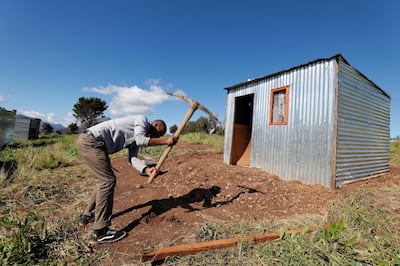
It may be that Mr Ramaphosa is playing for time, political analysts say. A final vote on changing the constitution will only happen after the elections in two months. A solid win for the ANC will strengthen his position in the party, and weaken proponents of changing the constitution to grant the government the right to confiscate land without compensation.
Such uncertainty has not played well with South Africa’s international standing. Last year, US President Donald Trump waded in, sending a late-night tweet in which he said he had asked his Secretary of State to study "land and farm seizures" in South Africa, Reuters reported.
Just last week, the US Deputy Secretary of State John Sullivan was in the country and met with farming groups and land activists, where he acknowledged the difficulty of the land issue.
"Land reform has gotten substantial publicity in the US," Mr Sullivan told journalists in Pretoria. "There was a front-page story on the Sunday New York Times last week. But I think there is some misinformation in the US, the issue is complex and I don't think it translated well across the ocean [or] has been covered with the depth and perspective that is necessary."
For now, radical parties on the left of the ANC continue to push for full confiscation of all private property. One such organisation is Black First Land First (BLF) whose leader, Andile Mgxitama, says nothing less than complete land nationalisation will suffice.
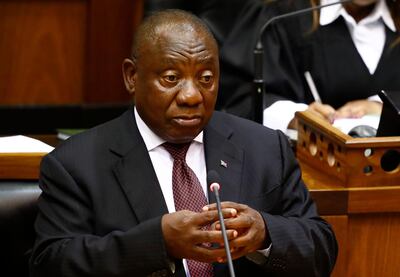
In March, Mr Ngxitama registered as a candidate for the upcoming election, and said his party would not accept whites, whom he called ‘land thieves’ as members of his organisation.
“BLF is going to parliament, and will continue its programme of ending white monopoly capital rule, including the taking back of all land which was stolen by the settler coloniser,” he says.
One of the biggest political opponents to constitutional change is the Democratic Alliance (DA), the official opposition in parliament. Yet the DA mayor of Johannesburg, Herman Mashaba, is essentially pioneering confiscation without compensation – by ordering the seizure of hundreds of slum buildings in the city and handing them to developers.
“My intention is to expropriate buildings where the owners can’t be found and offer them to the private sector, and ask for proposals to turn them into affordable accommodation.”
At least 500 buildings deemed to be abandoned slums are in Mr Mashaba’s sights. He says the city is facing an estimated backlog of 300‚000 housing units. As many as 3‚000 people migrate to the city each month, many from rural South Africa and most of them end up in one of nearly 200 squatter settlements around Johannesburg. Mr Mashaba is applying for court orders to seize buildings in the city and turn them into affordable accommodation.
Mr Mashaba is a self-made millionaire, a self-declared “capitalist crusader” and has even expressed admiration for Mr Trump. In spite of his conservative economics, he has also managed to ally with the far-left Economic Freedom Fighters (EFF), with whom he secured a coalition to win the mayorship from the ANC in 2016.
This alliance has not sat comfortably with everyone in his party the DA, especially as the EFF is the third largest political party in South Africa, and wants full nationalisation of all private property including private homes and farms.
However, he says the cooperation between two organisations that share little in common points the way to reconciling South Africans over the land issue.
“We have the responsibility to make Joburg a city where people can come and invest and I can assure you that we as the multi-party are working on it.”
